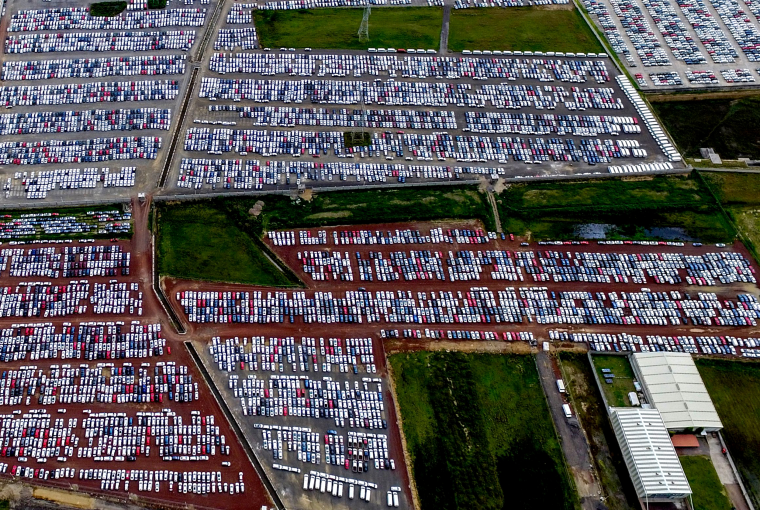
President Donald Trump’s threat to close the Mexican border could have a potentially devastating effect on the U.S. economy — and there are few places where that would be felt more immediately than in the American auto industry.
"Security is more important than trade," Trump said Tuesday afternoon when asked by reporters if he was concerned about the hit to the U.S. economy.
Roughly 37 percent of the imported parts used on U.S.-made vehicles are imported from Mexico, including critical pieces like the wiring harnesses used on 70 percent of all vehicles assembled in the States. Disrupting that flow could idle many of the more than 1 million employees at U.S. auto assembly and parts plants.
“It would be a major disruption” if a border shutdown were to last more than a couple of days, said David Cole, director-emeritus of the Center for Automotive Research.
How long manufacturers could sidestep a border closure would depend, said Cole, “on how much inventory they keep in stock.” But as automakers have migrated to a just-in-time manufacturing process, where most parts arrive at an assembly plants just days, and sometimes even minutes, before they’re needed, there is little to fall back on.
“If Mexico doesn’t immediately stop ALL illegal immigration coming into the United States through our Southern Border, I will be CLOSING the Border, or large sections of the Border, next week,” Trump tweeted last Friday.
The president’s threat is the latest move in an ongoing battle that began when Trump was still a candidate. He had repeatedly pressed manufacturers like Ford and General Motors to shift vehicle production back from Mexican plants — though there has been little move in that direction. Trump also pressed trade partners Mexico and Canada to renegotiate the North American Free Trade Agreement. Renamed USMCA, the new treaty has yet to be ratified by Congress and observers like Cole believe the impact on the auto industry will be relatively marginal.
The impact of a border shutdown, however, could be far more substantial, considering the U.S. imported $59.4 billion worth of Mexican-made auto parts last year. At the same time, American automakers and auto parts manufacturers send $32.5 billion worth of parts and vehicles south of the border. All told, that works out to an average of about $250 million worth of automotive goods every single day.
In some instances, automakers would be able to keep their plants running if the parts they would be missing are minor, such as plastic trim. They would have to stockpile the vehicles, however, until the shutdown ended and parts were again made available. But other parts would make it difficult to continue production. Wiring harnesses, for example, are some of the first parts installed on an assembly line.
Were Trump to move in the coming weeks it could hit automakers at a particularly vulnerable time, spring traditionally bringing the industry’s strongest sales.
NBC News reached out to a number of automakers for their reaction to the border shutdown threat. While none wished to go on the record, several said they are “monitoring the situation.”
"Any action that stops commerce at the border would be harmful to the U.S. economy, and in particular, the auto industry," said Matt Blunt, president of the American Automotive Policy Council trade group. "Access to Mexico’s market place and North American integration are critical to operations in the U.S."
Since NAFTA came into force on Jan. 1, 1994, automakers have broadly integrated their U.S., Mexican and Canadian operations. At the same time, Mexico has evolved from an industry backwater to become one of the world’s largest automotive manufacturers. The NAFTA agreement has contributed to that growth, as have the many other free trade agreements the country has negotiated. Low labor costs are the other contributing factor.
Whether Trump will go ahead with the border closure remains to be seen, with reports from the White House indicating some officials are pushing back, warning the president of the potential impact on the U.S. economy. But acting White House chief of staff Mick Mulvaney said on Sunday that heading off that move would require “something dramatic.”
The latest threat comes at a time when the auto industry is struggling to cope with a variety of other Trump trade moves. That includes the tariffs on imported aluminum and steel that, according to both Ford and General Motors, cost them each about $1 billion last year.
The president is meanwhile considering several other trade measures. He has until next month to decide whether to follow up with new tariffs on imported cars and car parts. Because of the large number of foreign-made parts used on American assembly lines, the cost could be substantial. Toyota has warned the move could increase the price tag of a Kentucky-made Camry sedan by as much as $1,600.
“There is nothing the auto industry hates more than chaos, which makes it difficult to plan ahead,” said analyst Cole. But when it comes to actions that could impact the auto industry, he added, chaos is the way the administration operates